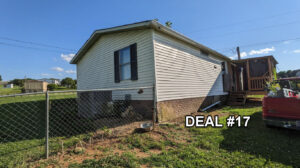Welcome back,
Today’s lesson is designed to help you, the investor, get more comfortable interviewing sellers and their mobile homes for sale. This exercise is aimed to help prepare you to:
- know when a seller is full of B.S.
- look for warning signs in any mobile home.
- get comfortable being in control while interviewing sellers and properties.
- What would a Manufactured Home Investor do?
There is an old real estate saying that says “Sellers are liars”. Personally I do not believe this statement. Likewise you could make the same argument about Buyers.
The list below represents only a fraction of the scenarios that may happen to you when you are personally speaking with a seller or over the phone with a seller. Keep in mind your goal is to always have clarity in what home you are buying. If you discover more repairs needed than what was originally disclosed the deal is not necessarily over however the price and terms will now be renegotiated in your favor. Does this make sense?
Disclaimer: The below role-playing exercise is based solely from of my personal experience and the experience of the clients I help.
Friendly Place Road, Anywhere, USA
Scene:
You are walking inside and around a nice looking single-wide mobile home with your friendly seller. This manufactured home was built in 1989 and has 3 bedrooms and 2 full bathrooms. The seller is needing to sell in the next 45 days due to a job transfer out of state. The sellers are happy to be starting a new life in another state and you are happy for them both.
The home is a smaller 12ft x 55ft mobile home with a split floor-plan, 2 bedrooms up front and the master bedroom in the back. The home backs up to a wooded preserve so it is peacefully quite. The mobile home has been on the market for 90 days with 2 buyers wanting the home but not getting approved at the park. You are very interested in the home and have already discussed purchasing the homes for a substantially reduced price and a fast sale.

1.) You are a trained mobile home investor so you know to walk around and step on every-square-foot of floor inside the home. You feel a 1ft x 4 ft “weird-spot” in the floor next to the children’s bed. The carpet is nice but you can’t help feeling that there is something wrong with this spot under the carpet. You ask the seller about this?
The seller tells you that this spot was always like that since they moved in and that it has never gotten any worse.
What do you do next? Clarity is key. Is the mobile home splitting, is it a raised beam, or simply a repair-job gone bad? You need to know what you are dealing with before making any offers.
Ask to pull the carpet up gently and look at what the issue really is. Replace the carpet after you are done. If you really like the home and the seller hesitates at allowing you pulling up their carpet you may want to offer to pay a flat fee of $10-$40 for the inconvenience of temporarily pulling up their carpets. If/when you purchase the home this money will be deducted from the purchase price.
If after you explain your intentions with the seller and they disagree you must assume that this piece of subfloor will need replacing or there are structural issues. Contacting your handyman or woman to walk through the home with you is the next step before purchasing. This will also give you more face to face time with the seller.

2.) The seller tells you that 2 other separate buyers wanted to buy the home but the park denied their applications.
What may this tell you? This may tell you that you may run into this similar problem when trying to resell this home. Keep in mind you will have more buyers compared to the seller because you are willing to sell for monthly payments. It is important to always verify what every mobile home park screens for in their background and credit checks. If the park is too strict with their application process you might consider passing on the deal.
Real Life Story: This has only happened to me once. It was in the start of my career and I purchased a nice mobile home inside a beautiful park. I did not have to get approved as the park manager knew I would not be living in the home. The park required every buyer living there to have a credit beacon score over 700. In case you did not know that is absurdly high for a mobile home community. Also the application was 4 pages long and $75 per applicant! Needless to say this home was hard to get anyone approved for. It took me 9 tries to finally get the home sold. Phew!
 |
 |
3.) You bring a flashlight with you on the appointment. While visually inspecting the home you notice that in the interior of the master bedroom closet there are some discolored areas on the ceiling. The spots only cover an area approximately 1ft by 1ft and are now completely dry. You believe the material of the ceiling is sheet-rock. No painting or cover up on the ceiling has be done.
You ask the seller about this and the seller tells you that this leak has been fixed weeks ago and the spot is now dry. He says a branch fell and caused a small hole in the roof. The seller says he fixed the roof by re-shingling the small hole in the roof weeks ago.
What do you do next? Verify the leak is stopped and repaired. It is important to verify that the seller is correct and no more leak is present.
Without lifting up the ceiling you may not be able to tell if any water damage or mold exists in the ceiling area. If you are lucky enough to have a big rain storm before or after this appointment always try to re/visit the home then to double-check for active roof and window leaks. If after this rain storm the area is still dry you can assume the roof has been fixed and the ceiling is just stained. No further action is needed.
If there is no rain storm available you will want to bring a handyman or inspector with you to verify the repairs needed. The handyman will likely want to walk on the roof if a ladder is available.

4.) The weather is cold, but not freezing. You arrive to see that all the kids are home from school and paying video games on the living room television. As you walk through the kitchen you notice the oven door is open, the oven is empty, and the oven is on.
What might this tell you? This may tell you that the furnace is broken and the stove is substituting as a heat source. A mobile home that you resell should almost always have a heat source included. This can be a considerable cost so you will want to negotiate this cost into the cost of the mobile home. While it is not hard to sell a mobile home without heating it is always nice to have heat included for your buyer.

5.) The home has a split floor plan with one of the second bedrooms being reduced 3 feet in size due to the hallway.
What might this mean to you? 2 bedroom and 3 bedroom single-wide mobile homes built in the 1980s, and especially in the 1970s, typically have 1 notoriously small bedroom in regards to single-wide mobile homes. If any bedrooms seem small to you then the room will also seem small to your potential tenant-buyers. This will reduce the number of interested applicants making it harder to resell. If the room is very small, less than 6ft x 6ft you may want to advertise the home as a 2 bedroom and let the buyers be surprised to find an additional bedroom, as opposed to overselling the home and the prospective buyers being disappointed in a very small 3rd bedroom. Does this make sense?

6.) The seller has a central heat and air conditioning unit for the entire mobile home. The home is vinyl sided with great curb appeal. The seller also has window air conditioning units in all 3 bedrooms and 1 in the living room. The seller has agreed to include these with the home too. You ask the seller why they have window units and a central AC unit.
The seller casually tells you that the central heat and air conditioning unit works fine. The reason for the window units is to cut down on the electric bill.
Do you believe the seller? Not yet. Do not buy this home without turning on power to the home and verifying the AC blows cold air. If the AC does not work then a handyman or qualified AC technician needs to inspect the unit to give you a reasonable price to fix or replace the unit. This repair cost, plus 30% for your time, should be deducted from the current purchase price.
If the seller will not turn on power due to financial constraints than you should asap.

7.) While inspecting the exterior of the mobile home you notice that the seller has taken care of the home beautifully. A clean pressure-washed exterior and manicured flower-bed show a great pride for the unit. You notice the main breaker box and decide to give it a check. You spot the main breaker is 150 amps to the entire home.
What this tells you about the home? You always want to check how many amps are feeding the home. If a mobile home has only a 50 amp service it will be difficult to run many appliances or window a/c units at once. This will make it uncomfortable for your tenant-buyers to live. Most mobile homes these days have 150 amps or more. Look for 100 amp service or higher in all mobile homes you purchase for investment.

8.) While checking the Title you see that the seller is not the owner named on the Title. You ask him about this?
The seller tells you he purchased the home from an elderly woman that has moved away since. This was 2 years ago and the Title has never been put into his name. No Bill of Sale is available. The seller is unavailable. The owner’s signature is on the Title correctly as “seller”. The park manager took over 1 year ago and knows that he has always paid lot rent on time.
What should you do? If the Title is already signed correctly by the seller than in many states the Title can be transferred into a “buyer’s” name easily. In other states the owner must sign a state-approved-form during the transfer process so transfer will be difficult. Ultimately the seller must put the home in their name OR you must help track down the owner to sign as seller. I suggest you take the first path if the Title is already signed by the owner of record as seller. Helping the seller transfer the Title is a great idea to go the extra mile.
What should you do if the seller does not have the Title and has the same story? Unfortunately there is little help you can offer without the Title present in most states besides Texas, New Hampshire and Vermont. Even trying to obtain a duplicate Title will prove difficult without the owner of record. There is 1 advanced strategy for helping the seller and creating profit however it is advanced and I will not be talking about that method today.
The moral of the exercise is to verify everything the seller tells you with your own 2 eyes. The advice of an experienced handyman or handy-woman can be the best few dollars you ever spend. Many times your handymen and women will do these walk-throughs for free. The ultimate goal is to know exactly what you are buying and to not get fooled by a rash decision or inexperience.
Make sure to always have a trained-eye looking over your shoulders while investing. We all should have multiple mentors at any one time.
Love what you do daily,
John Fedro
support@mobilehomeinvesting.net
To reveal the answers above highlight the areas of the screen after the bold questions like in picture below.
Related Manufactured Home Help videos:













13 Responses
So glad I stumbled onto your website. I originally began investing back in 2007. I know, great year to get started. lol. I have closed a number of deals but now really want to learn mobile home investing. Your site and formula look very very complete with positive reviews. Is there anything else you suggest or think I would need to be profitable this year?
Thank you again. Ps. I love the role playing idea to help teach. Hope there is more.
Hi Josh,
Thank you for commenting and your kind words. This site is a labor of love. 🙂
With regards to your question about things I can suggest for you here are my thoughts:
1. Get trained and understand this business, I mean really understand it (theory and applicable action steps)
2. Take action everyday with clarity
3. Have a mentor or someone available via phone or email to assist you through the inevitable hurdles you will face.
4. Keep accountable to someone. The fact that anyone has done this before you means YOU can do this too!
Hope this helps and makes sense to you.
Talk soon,
John
I really liked this format, with the question/hidden answer.
Great blog post!
Hi Joe,
Thanks for your kind words. I am glad that you like it and more happy that it has provided you real value. I was trying to think of a creative way to teach, and viola!
Thanks for reading.
John
I’ve encountered every one of these scenarios, and the solutions can be simple or nothing short of a nightmare:
1) “Weird spot” obviously means a subfloor issue. Being that it is directly next to the child’s bed, it’s one of 5 things:
-a) That spot was actually there before,
-b) Water damage to due a spill from the child whilst in the bed that was never cleaned up.
-c) Urine damage from the child
-d) Soft spot (weakness) due to the child jumping from the bed and landing on the floor
-e) A water line may have broken previously and damaged only the subfloor from beneath
* Either way, the spot needs to be repaired and needs to be calculated into the offer you present
2) a) The seller is “fluffing” a story in order to create the immediacy of purchasing this home
b) 2 people actually have applied to the park and have been denied due to lack of qualification
* This may reflect that you’ll have a hard time getting any of your own potential clientele approved due to very strict qualifications.
3) You need proof that the leak has been repaired. Ask the seller exactly what was corrected in order to remedy the situation, and verify their statement by inspecting their work yourself. If you’re capable of getting on the roof, it will be very simple to see if there are any newer looking shingles compared to the rest of the roof, and/or any new tar/sealant if it’s a metal roof.
4) The furnace is broken and/or nonexistent, or the gas has been shut off if the furnace is a gas unit. Be sure to verify this either way. *FYI – if someone uses an oven to heat a home for an extended period of time, this can severly weaken the subfloor* I know this from experience growing up with no heat at times in our house.
5) Must be an older home. One thing to keep in mind is to always look for the HUD dataplate in the home to verify its age and its building specifications. If no dataplate can be found or doesn’t exist, this means that the home is pre-HUD (built before 1976) and most likely isn’t built to today’s standards. This can be a bad investment as certain counties/jurisdictions require mobile homes be post-HUD. *Important note* – Even if a pre-1976 home is “grandfathered in”, the rules may change once the homes changes ownership. Word to the wise, do your research!
6) Not necessarily. There are a couple of reasons why the seller has multiple window units and doesn’t run the central A/C…
-a) outside unit and/or a-coil are missing and/or are not working correctly
-b) the breaker for the A/C unit is missing, broken and/or damaged
*Case in point, be sure to have seller run the central air/heating unit in order to prove that it, in fact, does work. Also, make sure that all window units work as well. Another important factor to keep in mind is to notice the windows. If they are vinyl thermal pane windows, see if they are fogged between the panes. If so, this indicates that the seal has failed and most likely will need to be replaced. Also, look (AND TOUCH) at the drywall beneath all windows. If there is evidence of soft spots or mold, then water has entered in and seeped beneath the windows, whether they have window units or not. Again, do your research!
7) The amperes which feed a home usually indicate the age of the home, and/or the requirements that were meant in order for its function. A home with less amps is usually an older home. Also, be sure to watch out for “custom” breaker boxes. Some “do it yourselfers” have a tendency to try and conserve energy by installing lower amped breakers and breaker boxes, yet lack the knowledge of electrical work and can cause more harm than good.
8) Title work can be very tricky if you don’t know what to look for. Obviously, you want to make sure that if the title is actually signed, be sure to double check that the “seller” and “buyer” locations on the back of title are printed and signed by the correct parties. If there are no signatures, then this causes an issue with having to hunt down the original seller. If finding the original seller is not possible, the laws in each state are different in respect to obtaining a new title. *HUGE THING TO REMEMBER – ALWAYS BE SURE THAT LOT RENT AND/OR ANY DELINQUENT PERSONAL PROPERTY TAXES ARE UP TO DATE! There are some states where delinquent taxes follow the people who owned the home, however, there are also many others where the taxes follow the home. Again, DO YOUR RESEARCH!!!
I’ve been in this business for many years and have learned from many different scenarios exactly what to look for and what to invest in. Trust is a very valued commodity when you decide to invest, however, you can’t always count on someone’s word. You must practice due diligence, learn from mistakes, go above and beyond when researching, and, at times, seek guidance from others who have been in this trade before you.
GOOD LUCK IN EVERYONE’S PURSUIT! You can contact me anytime if you’d like to chat more.
Steve
Hi Steven,
Great advice and comments my friend. This is why I love this site and the web. Most folks are willing to help and build-up others looking for help. Your words are true and you have had good experiences. Glad to see you are as much in love with this business as me, and have stayed strong in your investing rather than bailed at the first sign of trouble. Kudos!
Best,
John Fedro
Thank you for the information. I hope mobile home is not a good plan for investing. Investing in mobile home is like investing in a car. It is always depreciating and becomes a liability.. The only advantage is that you can modify it as per your needs.
I am living in a RTM home by B&B homes and have renewed it 3 times. The feel is wonderful as i have set up in a cool location.
Hi Preeti,
I am glad that you have gained value from this exercise. You say that you “hope” that mobile homes are not a good investment? Why are you sabotaging yourself before you ever begin? If mobile home investing is not for you OR you don’t see the benefits than by all means continue to do what you are doing to provide for yourself and your family.
Over the past 6 years I have helped many people start from nothing and happily and successfully invest in mobile homes. Money and credit is not needed however ambition and a positive attitude is a must. Does this make sense?
Mobile home investing is NOT like investing in cars for many many reasons both obvious and subtle. Mobile homes in parks do depreciate in value however this only affects us as investors if we are refinancing them or obtaining insurance, both of which do not limit or restrict our ability to help sellers, help buyers, and make consistent profit when you know how to invest properly.
I am also not sure what you mean by your statement that you have renewed the home 3 times however I am glad that you are liking your mh.
If you have any specific mobile home related questions let me know.
All the best,
John
Hi John,
What an awesome and fun game. At first I thought there were just big open gaps in the article, then I saw how to play. This helps a ton. I’ll be looking to get started with your training in early January.
Thanks man. Please keep doing what you are doing.
Darren Youth
Hi Darren,
Thank you for commenting and your kind words. I am happy you have already gained value in these little exercises. I will keep them coming for sure.
I look forward to getting started with you too. I will be ready to run just as fast as you are when you get started however do not hesitate to ask any questions you may have before getting started. I say this because I want you clear on what to expect, both the daily work/energy this business takes and the rewards that are possible.
Talk soon,
John Fedro
Hi. We purchased a 1985 single wide, and want to replace with a new mobile. I was told I need 200amp service. Would the 1985 mobile already have the 200amp or do I need to do the upgrade. The 1985 never had any upgrades done. Thanks
Hi Josh,
Thank you for reaching out and connecting. Congratulations with regards to updating on the newer home. In 1985 will typically have 100 or 150 amp service through the home in my experience. Most new manufactured homes to require an upgrade to a 200 service. Let me know if this helps and answers your question. As always, if you have any follow-up questions never hesitate to reach out anytime. All the best.
Talk soon,
John